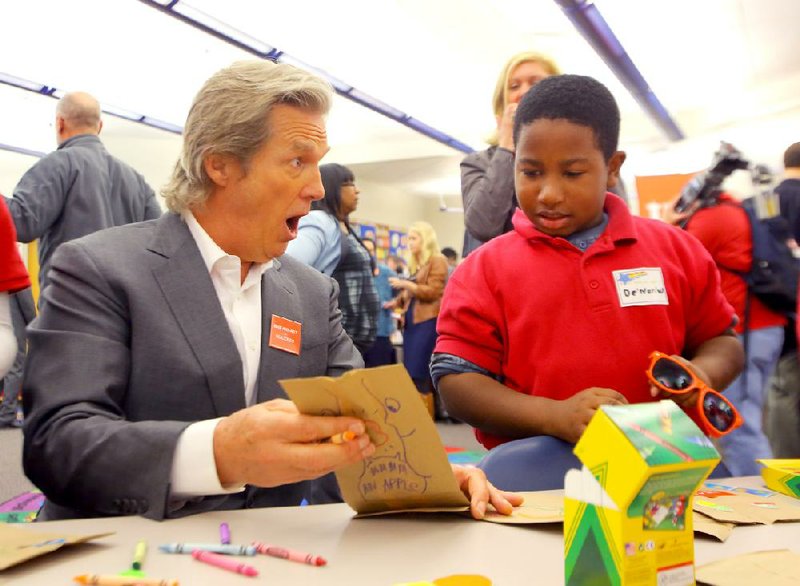Arkansas delivers thousands of free and reduced-cost school breakfasts to keep low-income children from being too hungry to learn.
The state’s breakfast plan - among the nation’s most effective hunger relief programs - brought actor Jeff Bridges to Stephens Elementary School in Little Rock on March 17. The orange button on his gray jacket spoke up before he did, reading: “Breakfast = Success.”
Bridges is national spokesman for the Washington-based Share Our Strength’s No Kid Hungry campaign, including Arkansas No Kid Hungry. He joined a group of Stephens third-graders in learning about the importance of a good breakfast, be it eggs, toast and milk, or waffle and orange juice.
The school served turkey sausage wraps that morning, and Bridges, 64, said his breakfast was “oatmeal, some fruit and coffee.”
The meal did wonders for the children, according to Share Our Strength’s latest studies. Students who eat school breakfast score almost 18 percent higher on standardized math tests than students who don’t, the organization reports. They attend 1.5 more days of school per year.
Breakfast plainly agreed with Bridges, too. The Academy Award winner (for Crazy Heart, 2009) called for breakfast-eaters to jump up and down to show how much energy they felt, and led a cheer for bananas. Later, he said the visit was “so inspiring.”
The school surrounded him “with good, excited people,” Bridges said. Other times, “I feel alone,” he said, pushing for answers to a tragedy that nobody wants to hear. “It’s an unsexy issue.”
Bridges founded the End Hunger Network in 1983, focused on world hunger. The more he learned about hunger, the more it made him think how awful he would feel to see his own three daughters go hungry, he said, and his view shifted to elementary school-age children - and to the question of what to do for them.
“I have a certain celebrity,” he said. “That’s something I can use.”
Children go hungry despite plenty of food to solve the problem, Bridges said. Part of the problem is that people don’t want to admit such a thing could happen, he said: American children with nothing to eat.
Share Our Strength ranks Arkansas better than 90 percent of other states at providing school breakfasts. Arkansas’ schools serve about 700,000 free and low-cost breakfasts a year - meals paid for by the U.S. Department of Agriculture.
But still, about a third of the state’s schoolchildren “struggle with hunger,” the organization reports. About half miss the breakfast they could be having with federal assistance.
Bridges promotes the idea of breakfast in the classroom, “breakfast before the bell.” The strategy calls for every child to receive breakfast first thing in the morning, all the same to avoid any embarrassment attached to a free meal. But schools have to agree.
The idea can be a tough sell, he said. Even free meals cost time to serve, and breakfast in the classroom requires the school to have extra equipment.
Morning meals typically come bagged, calling for sacks and baggers. Delivery requires carts, and people to push the carts. Meals tend to be such tidy, hand-held things as wraps and bites of fruit, but cleanup is part of the job, even if the students do it themselves.
Bridges said a few teachers have told him they worry about spills on the carpet - to which he shakes his mane of silver hair with a laugh and asks, “What’s more important?”
BREAKFAST CALL
About 200 of 1,000 public schools in Arkansas serve breakfast before the bell the way Stephens Elementary does, according to Nancy Conley of the Arkansas Hunger Relief Alliance, an association of food banks and food rescue organizations.
Schools are enlisted through the Arkansas No Kid Hungry campaign, founded by Gov. Mike Beebe in 2010, with partners including Share Our Strength and the state hunger relief alliance.
The governor joined Bridges, Share Our Strength founder Billy Shore and school principal Cynthia Collins of Franklin Elementary in Little Rock for a panel sponsored by the Clinton School of Public Service, also March 17.
Shore founded Share Our Strength in 1984, in response to famine in Ethiopia. He launched No Kid Hungry in 2006, based on the wisdom that mothers have known all along: Breakfast is good for you.
“We always knew it’s common sense,” Shore said. “But now, we’re gathering data.”
Three out of five teachers report that some of their students regularly come to school hungry, according to Share Our Strength’s numbers. Hunger translates nationally to millions of school absences.
Breakfast eaters do better at attending school, and students with regular attendance are 20 percent more likely to graduate from high school. They stand to earn $10,090 a year more.
All this, according to Shore’s organization, means simply having breakfast will help to bring about a next generation of adults with better incomes. Their children will be more likely to be well fed at home.
Shore said Arkansas’ breakfast program reaches 55 percent of children eligible to receive free and low-cost meals, “way better than the national average.”
Arkansas No Kid Hungry’s goal for this year is to get breakfast to 15,000 more children in 200 more schools.
If the program connected with 70 percent of eligible children in Arkansas, the result could be 25,860 students with better math scores, according to a study done for Share Our Strength by the consulting firm DeLoitte.
Students would attend38,789 more days of school per year, the study projects, and 6,465 more elementary school pupils would graduate from high school.
Meantime, breakfast pays off with the old-time cure-all of apples and other nutrition.
“Our students love breakfast in the classroom,” Collins told a crowd that filled the Wally Allen Ballroom at the Statehouse Convention Center. “They learn about food, they learn about each other, and they have a healthy breakfast.”
“We rarely see a kid with a stomach ache, anymore,” she said. Breakfast cleared up the common complaint that meant an absence from class to the see the school nurse.They weren’t sick, Collins said, they were hungry.
Beebe credited first lady Ginger Beebe for showing him the importance of school breakfast - not an issue for which he sought election, but one that has become increasingly important to him.
The beneficial value of breakfast “is a proven fact,” he said.
‘THERE’S A BEVERAGE HERE’
Bridges calls on one of his best-known movies to demonstrate the resolve it takes to solve hunger problems in Arkansas.
Not “The Dude,” the lazy White Russian-drinking, milk-mustached bowler he played in The Big Lebowski (1998) - nor even the lightning-fast Flynn, his role in Tron (1982) and Tron: Legacy (2010), the movies that gained him a child audience.
He cites the 2010 movie version of Arkansan Charles Portis’ novel, True Grit. Bridges was an Oscar nominee as best actor for his portrayal of Fort Smith Marshal Rooster Cogburn.
“True grit,” he said. “That’s how you do it - true grit.”
Family, Pages 34 on 03/26/2014


